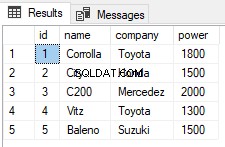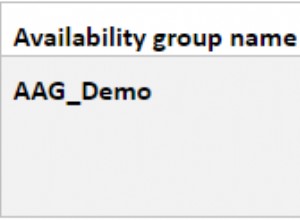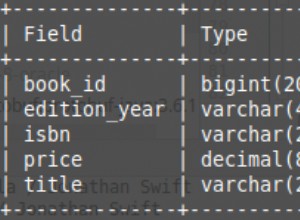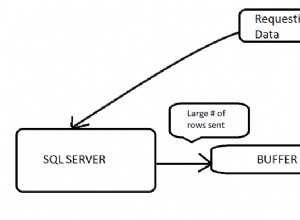Meine Antwort ist ein Update der Antwort von @santosh. Ich beziehe alle hier beschriebenen Best Practices ein:
- https://www.percona .com/blog/2014/12/19/store-uuid-optimized-way/
- https://mysqlserverteam.com/speichern-uuid-werte -in-mysql-tabellen/
Ich verwende die simple_uuid gem, da es „v1“-UUIDs generieren kann. Rubys eingebaute SecureRandom.uuid generiert v4. Wir brauchen v1, weil das den Zeitstempel als Teil der UUID enthält. Lesen Sie die obigen Links, um ein tieferes Verständnis zu erhalten. UUID() von MySQL -Funktion generiert v1-UUIDs.
app/models/concerns/binary_uuid_pk.rb
module BinaryUuidPk
extend ActiveSupport::Concern
included do
before_validation :set_id, on: :create
validates :id, presence: true
end
def set_id
uuid_object = SimpleUUID::UUID.new
uuid_string = ApplicationRecord.rearrange_time_of_uuid( uuid_object.to_guid )
uuid_binary = ApplicationRecord.id_binary( uuid_string )
self.id = uuid_binary
end
def uuid
self[:uuid] || (id.present? ? ApplicationRecord.format_uuid_with_hyphens( id.unpack('H*').first ).upcase : nil)
end
module ClassMethods
def format_uuid_with_hyphens( uuid_string_without_hyphens )
uuid_string_without_hyphens.rjust(32, '0').gsub(/^(.{8})(.{4})(.{4})(.{4})(.{12})$/, '\1-\2-\3-\4-\5')
end
def rearrange_time_of_uuid( uuid_string )
uuid_string_without_hyphens = "#{uuid_string[14, 4]}#{uuid_string[9, 4]}#{uuid_string[0, 8]}#{uuid_string[19, 4]}#{uuid_string[24..-1]}"
ApplicationRecord.format_uuid_with_hyphens( uuid_string_without_hyphens )
end
def id_binary( uuid_string )
# Alternate way: Array(uuid_string.downcase.gsub(/[^a-f0-9]/, '')).pack('H*')
SimpleUUID::UUID.new( uuid_string ).to_s
end
def id_str( uuid_binary_string )
SimpleUUID::UUID.new( uuid_binary_string ).to_guid
end
# Support both binary and text as IDs
def find( *ids )
ids = [ids] unless ids.is_a?( Array )
ids = ids.flatten
array_binary_ids = ids.each_with_object( [] ) do |id, array|
case id
when Integer
raise TypeError, 'Expecting only 36 character UUID strings as primary keys'
else
array << SimpleUUID::UUID.new( id ).to_s
end
end
super( array_binary_ids )
end
end
end
app/models/application_record.rb
## ApplicationRecord (new parent of all models in Rails 5)
class ApplicationRecord < ActiveRecord::Base
self.abstract_class = true
include BinaryUuidPk
end
Jetzt unterstützen alle Modelle optimierte UUID-Primärschlüssel.
Beispielmigration
class CreateUserProfiles < ActiveRecord::Migration[5.0]
def change
create_table :user_profiles, id: false do |t|
t.binary :id, limit: 16, primary_key: true, null: false
t.virtual :uuid, type: :string, limit: 36, as: "insert( insert( insert( insert( hex(id),9,0,'-' ), 14,0,'-' ), 19,0,'-' ), 24,0,'-' )"
t.index :uuid, unique: true
t.string :name, null: false
t.string :gender, null: false
t.date :date_of_birth
t.timestamps null: false
end
execute <<-SQL
CREATE TRIGGER before_insert_user_profiles
BEFORE INSERT ON user_profiles
FOR EACH ROW
BEGIN
IF new.id IS NULL THEN
SET new.id = UUID_TO_BIN(uuid(), 1);
END IF;
END
SQL
end
end
Fügen Sie UUID_TO_BIN() hinzu Funktion in die MySQL DB :
DELIMITER //
CREATE FUNCTION UUID_TO_BIN(string_uuid BINARY(36), swap_flag INT)
RETURNS BINARY(16)
LANGUAGE SQL DETERMINISTIC CONTAINS SQL SQL SECURITY INVOKER
RETURN
UNHEX(CONCAT(
SUBSTR(string_uuid, 15, 4),
SUBSTR(string_uuid, 10, 4),
SUBSTR(string_uuid, 1, 8),
SUBSTR(string_uuid, 20, 4),
SUBSTR(string_uuid, 25) ));
//
DELIMITER ;
Die obige Funktion ist in MySQL 8.0 und höher integriert. Zum Zeitpunkt des Schreibens ist 8.0 noch nicht allgemein verfügbar. Also füge ich die Funktion erst einmal hinzu. Aber ich habe die Funktionssignatur so beibehalten, wie sie in MySQL 8.0 vorhanden ist. Wenn wir also zu Version 8.0 wechseln, würden alle unsere Migrationen und Trigger immer noch funktionieren.




